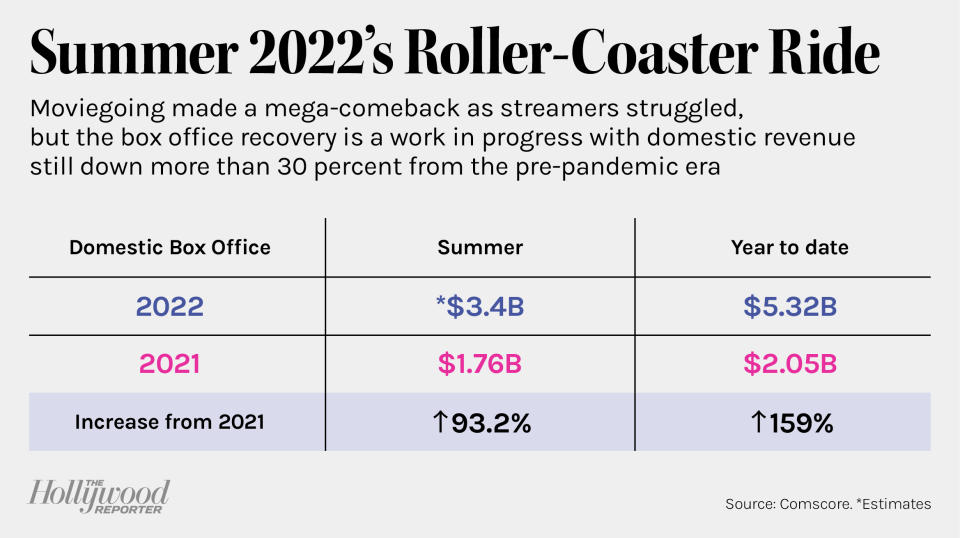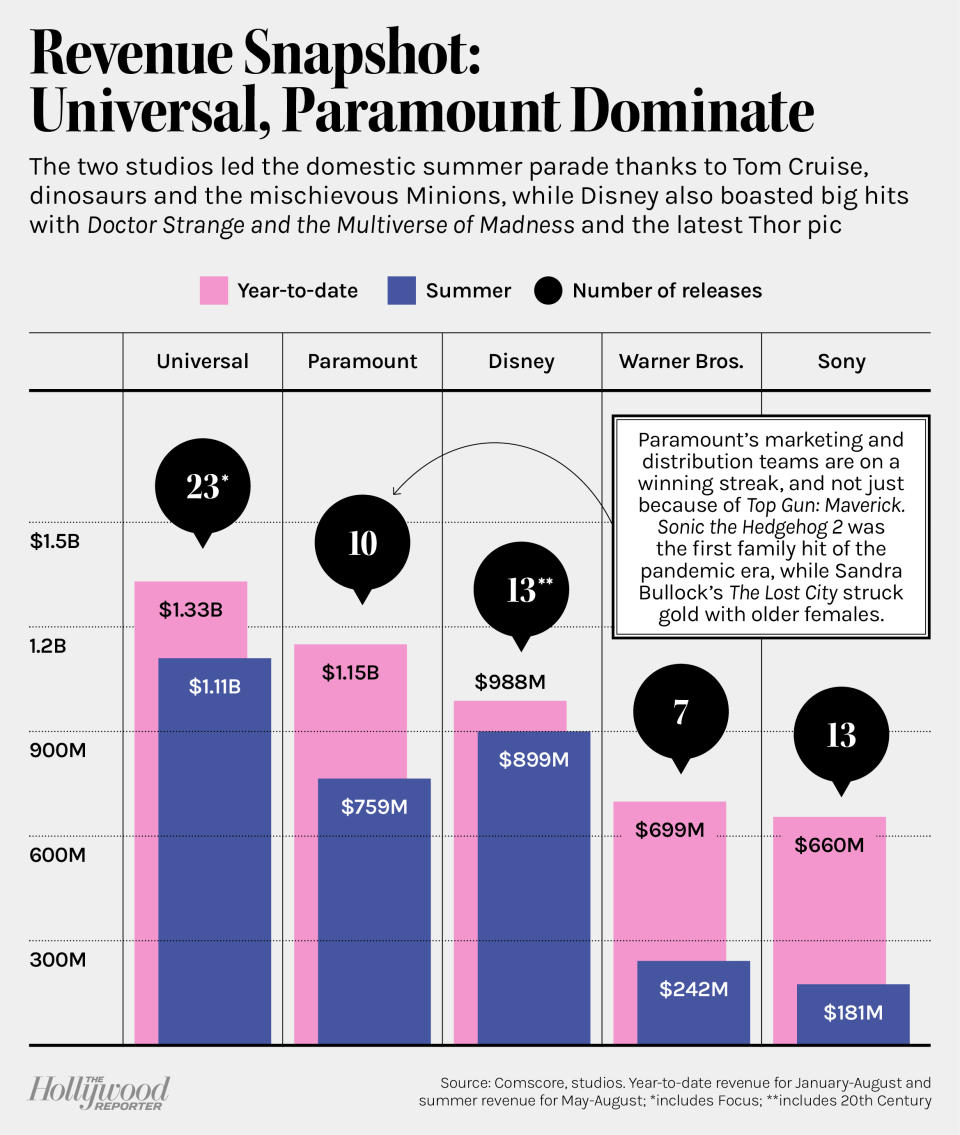Summer Box Office Soared, But Now What?
- Oops!Something went wrong.Please try again later.

Pocket change won’t buy much these days, but over Labor Day weekend consumers were able to see a movie for $3 at thousands of theaters throughout the U.S. The one-day promotion, part of National Cinema Day on Sept. 3, was unprecedented and designed both to celebrate a summer full of promise in regard to the box office recovery and to drum up interest in moviegoing amid an unusually slow August and September in terms of high-profile releases. Case-in-point regarding slim August offerings: the big winners of Labor Day were Top Gun: Maverick in its 15th weekend, a rerelease of Spider-Man: No Way Home and Jaws, a 47-year-old movie.
The marquee will heat up again in mid-October with the launch of the DC superhero pic Black Adam, starring Dwayne Johnson, among other event pics, although Halloween Ends will now open day-and-date in theaters and on Peacock on Oct. 14. While not exactly jazzed, exhibitors still expect the film to perform well. Also, Universal, which is releasing the film, has released far more movies than any other studio — including Focus Features titles — giving the studio a free-out-of-jail-card.
More from The Hollywood Reporter
'Mission: Impossible' Stars, Director on Latest Film's "Very Timely" Villain: "People Are Scared"
Greg Tarzan Davis Didn't Tell His 'Top Gun' Co-Stars About His 'Mission: Impossible' Casting
Behind the Slow-Motion Implosion of Regional Sports Networks
Rolando Rodriguez, the outgoing top operating executive at Marcus Theatres who also is board chairman at the National Association of Theatre Owners, explains the $3 pricing this way: “There is a lot of noise going on about how our industry is doing. We tend to focus on the negative narrative and a couple of chains that are in trouble,” referring to but not naming Cineworld, which disclosed major cash-crunch issues related to its debt burden. Adds Rodriguez, “We just went through one of the most devastating periods in our history — I’ve been in this business for 42 years — and the fact that so many cinemas have stood tall is amazing.”

Some amount of optimism is arguably in order as theater chains and Hollywood contemplate the lessons of the 2022 summer box office and the importance of a varied slate of films versus just tentpoles (streamers didn’t kill the theatrical midrange movie after all). Movies of all shapes and sizes prospered, from megahit Top Gun: Maverick — which has earned north of $1.4 billion globally to become one of the top-grossing films of all time — to smaller titles appealing to one or two quadrants of the audience, including older adults who aren’t as worried anymore about the pandemic.
“Audiences want to come back for compelling movies, even if it is hard to get their attention. We were in theaters for 10 weeks with Elvis,” says Warner Bros. president of domestic distribution Jeff Goldstein. “Older moviegoers were the hardest group to get back. Top Gun helped start to bring them back, and then Elvis did its work.” Adds Universal domestic chief Jim Orr, “There are still certain demographics are more difficult than others. But as is always the case, quality wins out.”.
It’s considered great if a film earns more than three times its domestic opening weekend. In the case of Elvis — directed by Baz Luhrmann and a needed win for Warners — the film saw a 4.7-times multiple (the Elvis Presley biopic has grossed $147.5 million domestically to date after launching to $31.2 million in June).
Longevity indeed was a theme of the summer. The Black Phone, which opened to $23.6 million, has amassed $89.3 million domestically and $157.2 million globally, while Michelle Yeoh starrer Everything Everywhere All at Once, which expanded throughout the summer after first opening in select theaters in March, has earned $68.5 million domestically and nearly $100 million globally, an incredible result for an indie film. “The highs are definitely higher than normal,” says Imax Entertainment president Megan Colligan. “Over time, it will become the business we are familiar with. We are very close to it, and I don’t think studios are asking anymore where audiences are.”
To Colligan’s point, domestic revenue at the North American box office for the summer should clock in at an estimated $3.4 billion, according to Comscore. (The Summer box office runs from the first Friday in May through Labor Day.) That’s up nearly 94 percent over 2021. But the more intriguing stat is that summer began to close the dramatic gap emerging during the pandemic. Revenue year-to-date is still running more than 30 percent behind the same period in 2019 ($7.25 billion), but combined ticket sales for summer 2022 are only 21.6 percent behind summer 2019 ($4.34 billion). And here’s a tantalizing tidbit: Removing a dismal August from the equation, domestic revenue for May through July was $2.9 billion, a downturn of just 16.6 percent from the same period in 2019 ($3.49 billion). And for the first time since the pandemic began, monthly ticket sales in North America crossed the $1 billion mark in July ($1.14 billion compared with $1.29 billion in 2019).
The Labor Day weekend schedule — and the decision to offer many showings for only $3 when the average ticket price is $12, according to data firm EntTelligene — epitomizes the dearth of product through mid-October. The two highest-profile offerings are rereleases of Jaws and Sony’s smash blockbuster Spider-Man: No Way Home, which proved the pandemic hadn’t destroyed theatrical when it grossed an astounding $1.9 billion following its December 2021 release. “It’s not the end of the world,” says AMC Theatres vp of programming and content Elizabeth Frank of the slowdown, which exhibitors have been aware was coming for months because of production and postproduction delays due to the pandemic. The strain on exhibitors is still no fun, although year-end highlights include James Cameron’s Avatar: The Way of Water, a follow-up to the top-grossing film in history at $2.87 billion. “We still have to find the cadence of film releases being back to normal. And as films continue to overperform across all the categories, that is the strongest case to be made for studios to invest in films,” says Frank, who was also a big proponent of the $3 National Cinema Day as a way of engaging moviegoers.

There’s also Marvel’s Black Panther: Wakanda Forever (Nov. 11), Disney’s Thanksgiving animated offering Strange World (Nov. 23), DreamWorks Animation’s Puss in Boots: The Last Wish (Dec. 21) and Paramount’s Babylon on Christmas day. Exhibitors weren’t exactly happy when Warners recently pushed back New Line’s sequel Shazam! Fury of the Gods from December to spring 2023 but think there’s still enough Christmas product. Tentpoles remain crucial for all involved.
Aside from Top Gun: Maverick, Marvel and Disney’s Doctor Strange and the Multiverse of Madness and Thor: Love and Thunder did huge summer business alongside Universal’s Jurassic World Dominion and Minions: The Rise of Gru. Thanks to Thor and the pesky Minions, Disney was No. 2 in summer marketshare for the summer domestically, although Paramount is No. 2 year to date.
But Universal is No. 1 in market share because of a varied slate of films and its sheer volume of releases, including Focus Features titles. Veronika Kwan Vandenberg, Universal’s international distribution chief, says the theatrical business creates cultural relevance that drives value across all the revenue streams, a point embraced by Wall Street as streamers face their first major moment of reckoning. “A thriving theatrical business relies on diverse content and really speaks to our strategy,” she says.
Paramount distribution veteran Chris Aronson has a message for both sides of the aisle. “Exhibition,” he says, “has to be more flexible in presenting value to the customer, and studios need to make compelling content.”
SUMMER BOX OFFICE SCORECARD: WINNERS …
Universal Chief Donna Langley. Who needs superheroes? Universal and its label Focus Features — home of the specialty hit Mrs. Harris Goes to Paris — have released 23 films in 2022, by far the most of any studio empire. Langley’s focus on a diverse slate of films — from Jurassic World: Dominion and Minions: The Rise of Gru to the microbudgeted The Black Phone, the most successful horror pic of the pandemic — is a huge win.
Everything Everywhere All at Once. “Remarkable” is one adjective used to describe the performance of A24’s indie sensation. The multiverse dramedy, starring Michelle Yeoh, has grossed $69.5 million domestically — not far behind big studio titles such as DC League of Super-Pets ($74.3 million) or Brad Pitt’s Bullet Train ($78.7 million). Daniel Kwan and Daniel Scheinert directed the film, which is bound to be an awards contender.
Baz Luhrmann’s Elvis. Those who were dubious about Luhrmann’s Elvis Presley biopic were quickly silenced. The movie, starring Austin Butler, joins an elite group of music-themed films (Rocketman, The Greatest Showman) that sang and sang and sang, earning nearly $148 million domestically and north of $277 million globally despite a modest opening.
Top Gun: Maverick. Tom Cruise’s sequel now ranks No. 9 on the all-time list of top-grossing films globally after collecting more than $1.4 billion. Here’s another milestone: It earned more than $1 million at the box office for 75 consecutive days, compared with 45 days for Star Wars: The Force Awakens and 38 days for Avengers: Endgame. High five.
… AND LOSERS:
Nicolas Cage. The media went gaga when news broke that Cage would play a fictionalized version of himself in the indie pic The Unbearable Weight of Massive Talent. The $30 million action-comedy, released in theaters in late April on the eve of the summer season, topped out at a disappointing $29 million. Unbearable, indeed.
Cineworld & Regal Cinemas. No one in Hollywood was surprised when Cineworld, parent company of Regal Cinemas in the U.S., confirmed it is exploring filing for Chapter 11 bankruptcy protection. The U.K.-based company cited a depleted fall film slate for its woes, but Wall Street analysts and movie studio sources point to Cineworld’s debt load as the larger problem.
Firestarter Flames Out. Horror maestro Jason Blum doesn’t miss very often, but Firestarter, a remake of the 1984 film that was based on the Stephen King novel, was barely a flicker upon its box office debut in mid-May. The pic topped out at roughly $15 million at the global box office against a budget of at least $12 million. One caveat: It debuted day-and-date on the Peacock streamer.
Pixar’s Lightyear. The Toy Story spinoff faced challenges, including a backlash orchestrated by GOP politicians like Florida Gov. Ron DeSantis, over a same-sex kiss Disney and Pixar reinstated in a show of solidarity for its employees. The pic, banned in much of the Middle East, earned just $226 million worldwide, compared with $869 million for Minions: The Rise of Gru.
A version of this story first appeared in the Sept. 6 issue of The Hollywood Reporter magazine. Click here to subscribe.
Best of The Hollywood Reporter
Natalie Portman at Cannes: "I Need to Leave the Drama for the Screen"
Ailing ‘Superman’ Star Valerie Perrine Finally Finds Her Hero: "The Guy Should Be Sainted"

